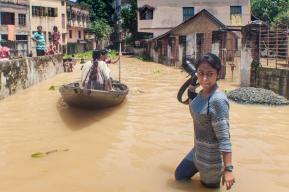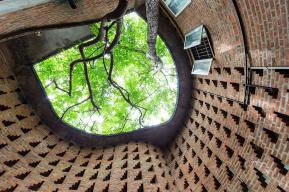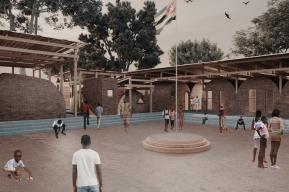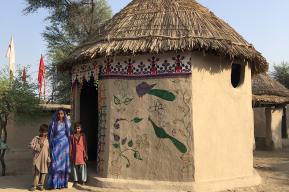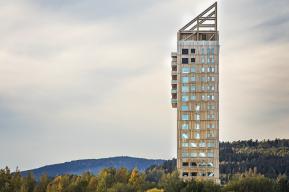فكرة
إدوارد نورتون: " التاريخ لن يسامح أولئك الذين ينكرون الحقائق"

إن تراجع التنوّع البيولوجي يضع مستقبل البشرية على المحكّ. ومع ذلك، وعلى الرّغم من التّحذيرات المتكرّرة، لا يزال السّباق نحو الرّبح مستمرّاً وأنماط حياتنا دون تغيير. في هذا الحوار، يدعو إدوارد نورتون، المدافِع الدؤوب عن الكوكب، والممثّل الفنّان، وسفير الأمم المتحدة للنّوايا الحسنة في مجال التنوّع البيولوجي، إلى تغيير الاتجاه.
أجرت الحوار ميلا إبراهيموفا
اليونسكو
هناك مليون نوع من الحيوانات والنّباتات المهدّدة بالانقراض. ما هو شعوركم شخصياً حيال هذه الكارثة المعلنة؟
أشعر بالحزن والغضب. ولعلّ الأجدر طرح السّؤال على هذا النّحو: "ما الذي تشعر به حيال هذا التّهديد المتمثّل في الانقراض المكثّف النّاجم عن الأنشطة البشرية؟". فلا يسعني سوى الشّعور بالحزن إزاء كلّ هذا العنف والخراب الذي نسبّبه للكائنات الحيّة الأخرى.
ومع ذلك، وعلى الرّغم من أن هذا الوضع بات اليوم حقيقة مثبتة علميّاً، فنحن لا نفعل شيئاً لتغيير عاداتنا في حين أن استقرار نمط حياتنا واقتصاداتنا أصبح محلّ رهان حيث تواصل الغالبية العظمى من الاقتصادات سباقها نحو الهاوية لتحقيق أرباح على المدى القصير وكأنّي بها تقول: "يومها لن أكون هنا، ولا أنتم أيضا، لذا علينا أن نزيد من أرباحنا إلى أقصى حدّ وندع المشكل لأحفادنا...". مثل هذا الموقف يثير غضبي! والتاريخ لن يسامح أولئك الذين ينكرون الحقائق من أجل تحقيق أرباح شخصية.
ما الذي تعلّمتموه من التزامكم لصالح التنوّع البيولوجي؟
لا يقتصر التنوّع البيولوجي على بيانات رقميّة. بل إني أودّ تسميته بـ"ثراء الحياة"، لأنّه يحيل، بالنّسبة إلى كل منّا، إلى القيمة الرّوحية للنّسيج المعقّد، على نحو رائع، للحياة على هذا الكوكب -أي إلى المعجزة الحقيقية لأشكال الحياة البرية-، وإلى حقيقة أنّ كامل اقتصادنا رهين التنوّع البيولوجي السّليم.
ويعجبني مثال النّحل والفراشات. فحتى لو استثمرنا مليارات الدّولارات في تكنولوجيا بشرية قادرة على تلقيح زراعاتنا، فلن يكون في مقدورنا إعادة إنتاج ما تنجزه الملقّحات لفائدتنا مجاناً. غير أنّنا نفضّل ترك المجال للصّناعة الكيمائية لإنتاج مبيدات للطفيليّات تتسبّب في انهيار أعداد النّحل والفراشات. إنه انتحار على الصّعيد الاقتصادي وبالنسبة إلى أمننا الغذائي.
إن أكثر الناس فقراً على هذا الكوكب هم الأكثر عرضة لتغيّر المناخ وعواقبه. فهل كنتم شاهداً، على الصّعيد الشّخصي، على تأثير تغيّر المناخ وفقدان التنوّع البيولوجي؟
نعم، في العديد من الأماكن وبأكثر من طريقة. فالرّعاة والمزارعون في أفريقيا جنوب الصحراء الكبرى، حيث أمضيت الكثير من الوقت، يواجهون دورات جفاف متزايدة الشدّة وفيضانات ترتبط، على نحو مباشر، بالاحترار المناخي وإزالة الغابات. أما في المناطق مثل المثلّث المرجاني في إندونيسيا،ـ حيث عمل والدي لفترة طويلة لحساب "منظمة الحفاظ على الطبيعة" The Nature Conservancyـ، يدمّر الصّيد الجائر سُبل عيش العديد من المجتمعات المحليّة الفقيرة. ويَحدث نفس الشّيء غرب أفريقيا. ومن ثمّ فإن تفاقم انعدام الأمن الغذائي جرّاء الصّيد الجائر يُفضي إلى زيادة ذبح الحيوانات البريّة ويؤدّي، مباشرة، إلى زيادة التعرّض إلى الأمراض حيوانية المصدر، وهي الأمراض التي تنتقل من الحيوانات إلى البشر ويمكن، كما نعلم الآن، أن تصيبنا جميعاً.
تتمثّل إحدى أولويّاتكم، بصفتكم سفير الأمم المتحدة للنّوايا الحسنة للتنوّع البيولوجي، في لفْت الانتباه إلى أن رفاه البشر لا ينفصل عن التنوّع البيولوجي. ألديكم شعور بأن صوتكم مسموع؟
من الْمُحْبِطِ أحياناً أن نجد أصواتًا تتعالى بقوّة في كلّ مكان من العالم بشأن هذه القضايا، في حين نرى الصّناعات الراسخة تعرقل الإرادة السياسية وتعيق التّغييرات الاستراتيجيّة الضروريّة.
وأنا، حقيقة، لا أقيّم مدى نجاح الحملات التّحسيسية استنادا إلى ما أقوم به من أنشطة، بل أعتقد أنّني جزء من جوقة الأجيال التي تسعى جاهدة لتجعل من هذه القضية الموضوع الرئيسي لعصرنا الحالي. كما أعتقد أن الوعي والقلق يزدادان مع مطلع كل جيل جديد.
ماهي أكبر نجاحاتكم في مجال إذكاء الوعي والتّحسيس؟
أشعر أنّني حققت نجاحاً كلّما دخل مشروع ما، سبق أن اشتغلت عليه سنوات طويلة، طور الإنجاز، مثل مشروع آبار الكربون في غابات تشيولو في كينيا. فلقد استغرق الأمر منّا أكثر من ست سنوات من الجهود قبل أن يتحصّل هذا المشروع، الذي هو ثمرة شراكة بين "صندوق الحفاظ على المناطق البرية" Maasai Wilderness Conservation Trust و"جمعية الحفظ الدولية" Consevation International، على العلامة الخاصة بضبط معايير الحدّ من انبعاثات الكربون النّاجمة عن تدهور الغابات REDD+VCS*، مع ما يقرب من 650.000 طن من تعويض الكربون سنوياً. والآن، نحن نبيع هذه الموارد من أجل تمويل المحافظة على المجتمعات المحلية وتنميتها. وهو ما يُعتبر نجاحا ملموسا.
لقد جُبتم العالم للتّنبيه إلى ضرورة جعل أنماط حياتنا متوافقة مع احترام الكوكب. ما الذي تعلّمتموه من كل هذه اللّقاءات؟
بيّنت لي هذه اللّقاءات أنّ ثمّة تَحَدٍّ يتجاوز فهمه الحدود الثقافيّة والعِرقيّة والاقتصاديّة والدّينية. إنه تحدٍّ يتجاوز هذه الحدود جميعها ويوحّدنا. لي أصدقاء شباب من الماساي في كينيا لديهم شغف بهذا الموضوع شأنهم شأن أصدقائي الإندونيسيين أو الأمريكيين. إنّه لمصدر أمل بالنسبة لي.
يشير تقرير المنبر الحكومي الدولي للعلوم والسياسات في مجال التنوع البيولوجي وخدمات النظام الإيكولوجي (IPBES) إلى أنّه، بالنّظر إلى النّسق الحالي، لا يمكن بلوغ أهداف حِفظ الطبيعة. كيف يمكن تغيير هذا الاتّجاه؟
يجب أن يتوقّف قادتنا عن إسناد الفضل إلى أنفسهم في اتّخاذ تدابير تدريجيّة ليس لها، في نهاية المطاف، أية جدوى. فنحن بحاجة إلى سياسة اقتصادية تحمّل التّكلفة الاجتماعية الهائلة للكربون وتدهور البيئة بجميع أشكاله على عاتق المسؤولين الحقيقيين. وما دمنا نواصل تحميل المجتمع بأسره هذه التكاليف دون أن نُحمّل "السوق الحرة" التّكاليف الحقيقية لأنشطتها، فإن الممارسات غير المستدامة ستتواصل.
ما هي رؤيتكم للمستقبل؟
إن رؤيتي للمستقبل هي بالأحرى متشائمة، ولكن يتعيّن علينا أن نظلّ ثابتي العزم. كما أعتقد أن قدرة البشرية على الإبداع مكّنتها أكثر من مرّة من إيجاد الحلول لمشاكل معقّدة، وغالباً ما يتمّ ذلك في اللّحظة التي لم نعد نتوقّعها. فبإمكاننا، إذن، أن نحقّق مبتغانا.
*يتمثل نهج REDD+ في الجهود التي تبذلها البلدان فيما يخص خفض الانبعاثات الناجمة عن إزالة الغابات وتدهورها في البلدان النامية ودور تدابير الحفظ والإدارة المستدامة للغابات وتحسين مخزونات الكربون في الغابات. أما معيار Verra أو VCS (معيار الكربون المعتمد) فهو معيار للتصديق على تخفيضات انبعاثات الكربون.
اقرأ المزيد عن دعم اليونسكو وشركة غيرلان للتنوّع البيولوجي عبر برنامج "تدريب المرأة على تربية النّحل"
مطالعات ذات صلة
التحديات الأخلاقية لتغيّر المناخ، رسالة اليونسكو، يوليو ـ سبتمبر 2019
أهلاً بكم في الأنثروبوسين!، رسالة اليونسكو، أبريل ـ يونيو 2018
تغير المناخ: إلى أين نحن ذاهبون؟ رسالة اليونسكو، ديسمبر 2009
الإنسان والطبيعة: العيش في وئام، رسالة اليونسكو، يونيو 2009
التنوع البيولوجي: الحياة المشتركة، رسالة اليونسكو، مايو 2000
اشترك في رسالة اليونسكو لمتابعة الأحداث. الاشتراك في النسخة الرقمية مجاني %100.
Interview by Mila Ibrahimova
UNESCO
One million animal and plant species are threatened with extinction. How does the threat of this mass extinction make you feel on a personal level?
Dismayed and angry, because the question is, more appropriately: ‘How does the threat of mass extinction driven by human activity make you feel?’ One can only be dismayed to learn what a violent and extensive destruction we’re wreaking on other living things. But it has to be acknowledged that we’ve now known about this impact in a deep, data-supported framework of confirming science.
And yet we continue, in the face of all the evidence, including the clear evidence that this behaviour threatens the stability of our way of life and our economies – the large majority of our industries continue the race to the bottom for the short-term bottom line. This “I’ll be dead, you’ll be dead, so let’s financially maximize in the short term and leave the problem to our grandkids” attitude... that’s what makes me angry. History will not be kind to those denying and obfuscating for personal gain, and we need to call them out.
What have you learned from your commitment to protect biodiversity?
Biodiversity sometimes has an academic ring to it. I like to characterize it as the “richness of life”, because that encompasses both the spiritual value, to all of us, of the magically complex web of life on this planet that we live on – the true miracle of life’s wild incarnations – while also acknowledging that our whole economy is tied to healthy biodiversity.
Our whole economy is tied to healthy biodiversity
I like the example of bees and butterflies. A trillion dollars of investment in a human technology to pollinate our crops cannot replicate what pollinators do for us for free. But we’d rather let chemical companies keep making pesticides that are causing a collapse of the populations of pollinators. This is suicide, both economically and in terms of food security.
Climate change and its consequences primarily affect the world’s poorest. Have you personally witnessed climate change and biodiversity loss?
Yes, in many places and many ways. Pastoralist herders and farmers in sub-Saharan Africa – where I’ve spent a lot of time – are facing intensifying cycles of drought and floods directly stemming from global warming and the clearing of forests. And in places like the Coral Triangle of Indonesia – where my father worked with the Nature Conservancy for many years – overfishing is devastating the livelihoods of many poor communities. Same in West Africa. And that increase of food insecurity driven by overfishing is leading to more killing of wildlife. This directly leads to more exposure to the zoonotic [diseases passed from animals to humans] transfer of viruses which – as we’re now experiencing – affects everyone.
One of your top priorities as UN Goodwill Ambassador for Biodiversity is to increase “people’s focus on the fact that human well-being is intertwined fundamentally with biodiversity”. Do you feel that your voice is being heard?
Sometimes it’s very frustrating to feel that voices all over the world are getting very loud about these issues and yet, the political will to act boldly is stymied by entrenched industries who put the brakes on the policy shift we need.
I don’t really assess ‘my success specifically’ in terms of awareness. I look at myself as part of a generational chorus of voices trying to insist that this becomes the most important issue of our time. And I do think awareness and concern grows greater in each subsequent generational demographic.
What have been your greatest successes in terms of raising awareness?
I feel personally successful when something I’ve been working on for many years, like the development of the Chyulu Forest Carbon Project [in Kenya], is realized as a goal. It took us over six years of work – a partnership between the Maasai Wilderness Conservation Trust and Conservation International – to get that project certified as a REDD+/VCS (Verified Carbon Standard)* project, generating about 650,000 tons of offset per year. And now we’re selling those credits to fund community conservation and development. That’s a tangible success.
You have travelled the world to raise awareness about making the way we live sustainable for our planet. What have you learned from the people you met along the way?
I’ve learned that this is a challenge that is truly understood across cultural, racial, economic, and religious lines. It transcends all of that and unites us. I have young Maasai friends in Kenya who are every bit as passionate about this as my Indonesian friends and my American friends. That gives me hope.
The challenge of living sustainably transcends all differences, and unites us
The Intergovernmental Science-Policy Platform on Biodiversity and Ecosystem Services (IPBES) report finds that global goals for nature conservation cannot be met by current trajectories. How do we change course?
Our national political leaders have to stop taking credit for incremental measures that are ultimately irrelevant. We need an economic policy that forces the massive social cost of carbon and environmental degradation in all forms to be borne by those doing the damage. Until we stop socializing those costs and make the “free market” bear its authentic costs of doing business, non-sustainable practices will not end.
Finally, how do you see the future?
It’s daunting, but we have to remain determined. And I think human ingenuity has created solutions to complex problems over and over again – often in ways that were unpredictable even just on the cusp of their emergence. We can do it.
*REDD+ stands for countries' efforts to reduce emissions from deforestation and forest degradation, and foster conservation, sustainable management of forests, and enhancement of forest carbon stocks. The Verified Carbon Standard, Verra or VCS, is a standard for certifying carbon emission reductions.

In the same issue



